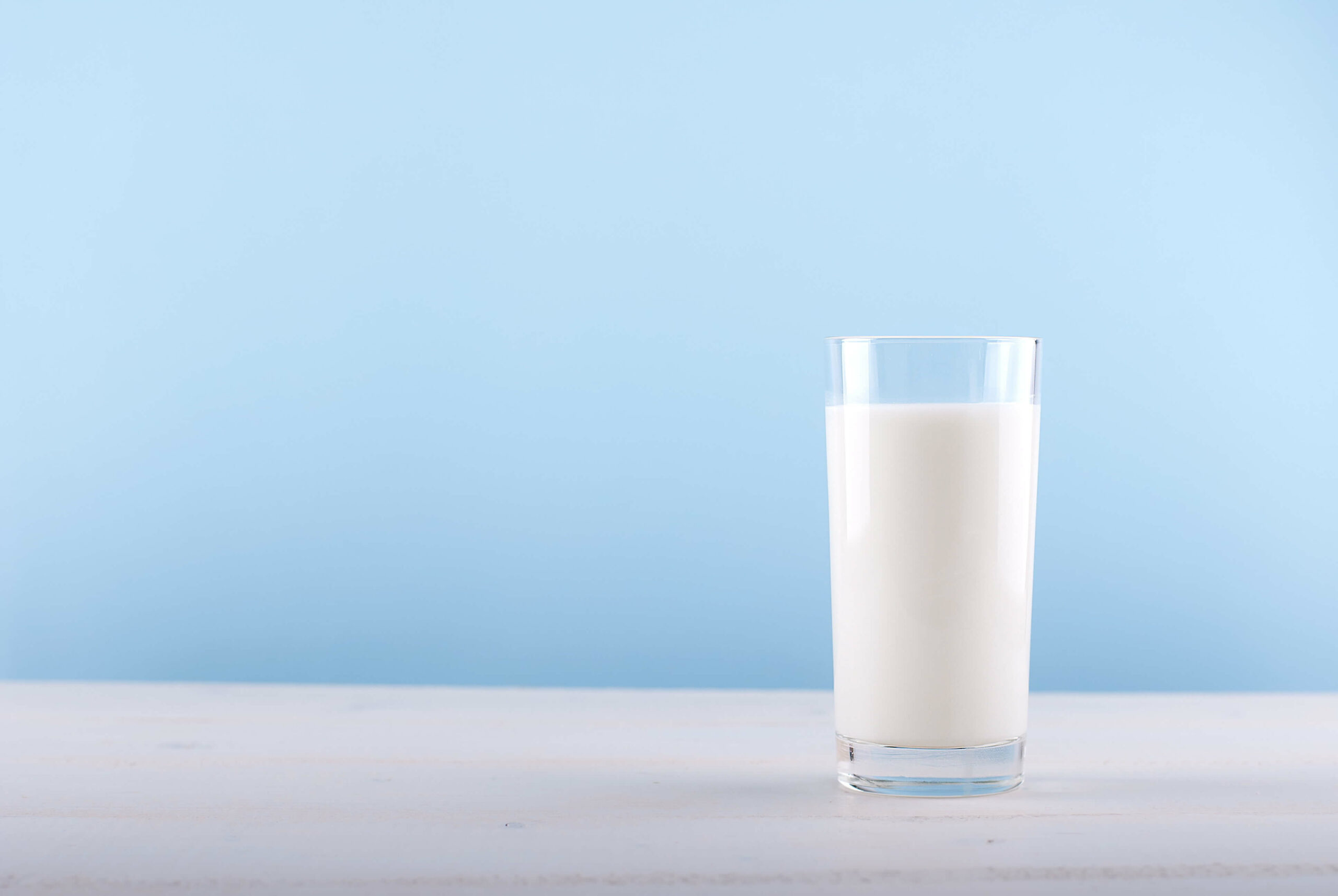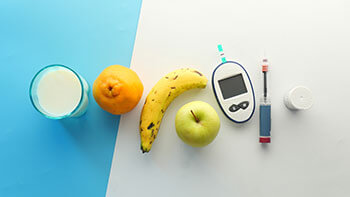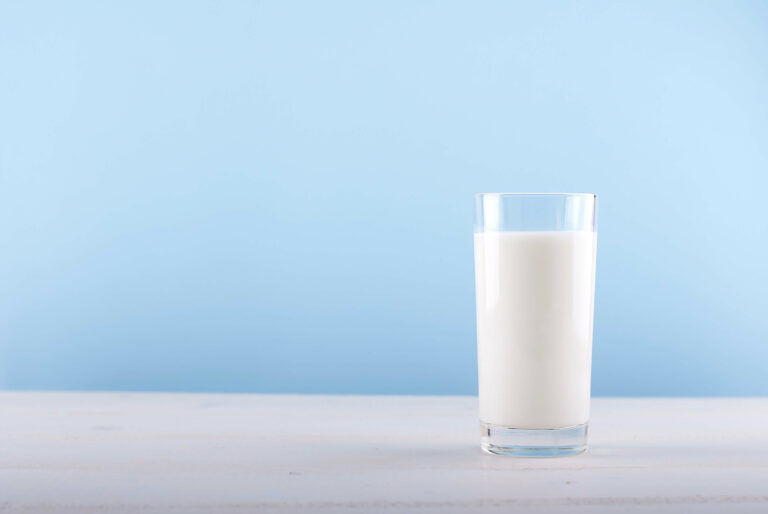Holistic Health Benefits of the Milk Matrix: Beyond Individual Nutrients For many years, nutrition research focused on how individual nutrients,..
GET THE FACTSMilk Nutritions Facts
Milk is a source of essential nutrients.
There is extensive evidence to show that including milk and dairy products in a balanced diet is beneficial to overall health.1
Milk contains a unique combination of nutrients known as the dairy matrix. Research shows that the collective metabolic effects of whole milk may be stronger than the effects of individual nutrients.2
Milk proteins contain bioactive peptides that are beneficial to the immune system and immunoglobulins, which kill or slow the growth of harmful microbes, such as bacteria and viruses.3 Nutrients in milk and dairy products that can help support a healthy immune system include protein, vitamin A, zinc, selenium, vitamin B12, and vitamin D.
The unique composition of milk, including protein, fat, vitamins and minerals supports the growth of healthy bacteria in our gut which can aid the absorption of nutrients, and assist in the maintenance of a healthy immune system.
One cup of milk is a source of 15 essential nutrients, which support good health:4, 5
VITAMIN A
Milk is a source of vitamin A, which helps support a healthy immune system.
Vitamin A is important for normal vision, immune health and human reproduction. Vitamin A also helps the heart, lungs, kidneys, and other organs work properly, and supports cell growth and dierentiation.14
| Nutrient 6 | Content in 1 Cup (250ml) milk | % Daily Value 7 |
|---|---|---|
| Protien | 9 g | N/A |
| Vitamin A | 116 RE | 13% |
| Vitamin B1 | 0.119 mg | 10% |
| Vitamin B2(Riboflavin) | 0.436 mg | 34% |
| Vitamin B3 | 2 mg NE | 13% |
| Vitamin B5 | 0.962 g | 19% |
| Vitamin B6 | 0.095 mg | 6% |
| Vitamin B12 | 1.16 ug | 48% |
| Vitamin D | 2.6 ug | 13% |
| Calcium | 291 mg | 22% |
| Magnesium | 26 mg | 6% |
| Phosphorus | 217 mg | 17% |
| Potassium | 340 mg | N/A |
| Selenium | 9.5 ug | 17% |
| Zinc | 0.95 ug | 9% |
VITAMIN B
Milk is a source of many B vitamins, which are all factors in energy metabolism.
- Vitamin B1 (thiamin): plays a critical role in energy metabolism and the growth, development, and function of cells. 15
- Vitamin B2 (riboflavin): is an essential component of two major coenzymes that play significant roles in energy production, cellular function, growth and development, and the metabolism of fats, medications and steroids. 16
- Vitamin B3 (niacin): helps convert food into energy and is important for cell function and development. 17
- Vitamin B5 (pantothenic acid): is necessary for many cellular functions, especially for making and breaking down fats. It also helps convert food into energy. 18
- Vitamin B6: is involved in more than 100 enzyme reactions, mostly with protein metabolism. It also plays a role in cognitive development. 19
Spotlight on vitamin B12.
Vitamin B12 is required for healthy red blood cell formation and DNA synthesis. Vitamin B12 also helps convert food into energy, regulate metabolism and supports mental function. 20It is necessary for the production of genetic material and the prevention of megaloblastic anemia.
Few plant sources contain vitamin B12, and the synthetic form used in supplements is less bioavailable than the natural form found in milk. Studies show that vitamin B12 naturally found in milk is absorbed up to two times better than synthetic supplements. 21
One cup of milk contains just under half of the vitamin B12 needed in a day in a natural, bioavailable form.
VITAMIN D
Milk is a source of vitamin D, which helps support a healthy immune system.
Milk is fortified with vitamin D, which helps the absorption of other nutrients, including calcium, which helps support bone health. The body uses calcium to signal the release of white blood cells to fight disease and inflammation. Presented together in milk, calcium and vitamin D synergistically support a healthy immune system.8, 9
Studies show that low vitamin D levels are associated with the onset of auto-immune diseases, such as multiple sclerosis. Vitamin D helps prevent rickets in children, and osteomalacia in adults. Together with calcium, vitamin D helps prevent osteoporosis in older adults. Vitamin D is also important for muscle, nerve and immune function.10
In winter when there are fewer daylight hours, Canadians may fall short of vitamin D, which is known as the sunshine vitamin. In addition to supplements, Canadians can get vitamin D from milk and dairy products. A cup of milk provides 13% of our daily vitamin D requirement. Vitamins D is also found in some fortified yogurts and some types of cheese.11, 12, 13
MINERALS
Milk is a source of a variety of minerals that are essential for the body, including magnesium, phosphorus, potassium, selenium, and zinc.
- Magnesium contributes to normal muscle function and energy metabolism, while also supporting tissue formatting and bone development.23
- Phosphorus is a factor in energy metabolism and helps with formation and maintenance of bones and teeth.24
- Potassium is an important electrolyte that supports muscle function and helps regulate blood pressure.25
- Selenium is a dietary antioxidant that helps our bodies create a protein that defends against oxidative stress.26
- Zinc is essential for healthy skin as it helps our bodies to create new skin cells, fight o infections, and reduce skin inflammation.27
CALCIUM
Milk is a great source of calcium.
Calcium contributes to the formation and maintenance of bones and teeth. 22It also plays a role in mediating blood vessel contraction and dilation, muscle function, blood clotting and nerve transmission. 28
If the body does not get enough calcium from food sources, it leaches calcium from bones and teeth, leading to calcium deficiency. This can reduce bone strength and lead to osteoporosis, which is characterized by fragile bones and an increased risk of falls.
Milk has one of the most bioavailable forms of calcium, with various dietary factors promoting calcium absorption. They include:
- Vitamin D
- Lactose
- Casein phosphopeptides in milk29
One cup of milk contains about 30% of the recommended daily value of calcium for adults, with our bodies absorbing about 27% of the mineral.30
A recent study shows that providing more milk and dairy foods to long-term care residents can help reduce the risk of falls and fractures due to the high calcium levels. In the study, dairy food intake increased from 2.0 to 3.5 servings daily, and the risk of fractures from falls decreased by 33 percent.31
PROTEIN
Milk contains complete protein.
Amino acids from proteins are the building blocks of all cells in the body – including immune cells and immune signaling molecules.32 Research has shown that amino acids can activate immune cells and stimulate the production of antibodies, cytokines and other cytotoxic substances that help keep us healthy.33
Milk is a source of high-quality, complete protein that contains all nine of the essential amino acids that the body cannot make on its own. Milk proteins, which are known for their high nutritional quality, also exhibit a wide range of bioactivities, including satiety, antimicrobial and mineral-binding properties.
Milk’s amino acid content closely matches human muscle, making it a simple choice for digestible and efficient protein.
Milk contains bioavailable fast and slow proteins:
- Whey (20%) is quickly digested to kick-start repair in the body. It’s extremely rich in essential amino acids.
- Casein (80%) is slowly digested to sustain repair
Spotlight on protein quality.
Researchers measured the quality of milk proteins vs. plant proteins and found that milk proteins were higher in quality compared to plant-based soy and pea proteins.34
The quality of protein indicates how easily it can be digested and used in the body. Methods for measuring protein quality assess the ability of a dietary protein to meet human requirements for indispensable amino acids.35
Digestible Indispensable Amino Acid Score (DIAAS) is an assessment method that accurately measures protein quality.36 Milk proteins are high quality and have DIAAS values greater than 100%.
In a recent study, milk proteins were ranked as “excellent” quality sources of protein, while soy proteins were ranked as “good” quality sources. Pea protein scored too low to qualify for a protein quality claim.37
Milk contains all nine of the essential amino acids that the body cannot make on its own.
FAT
Milk is an important source of the good fats that bodies require for optimal health.
Milk fat contains over 400 different types of fatty acids, including short, medium and long chain fatty acid, making it the most complex fat source in nature.38, 39
Emerging research indicates that dairy fat isn’t harmful to heart health. Further evidence shows that milk fat has not been associated with increased cardiovascular risk, type 2 diabetes or obesity. In fact, milk fat has either neutral (in milk) or beneficial effects (in fermented dairy, yogurt and cheese) on these health outcomes.40, 41, 42
A 15-year study involving more than 3,000 adults found full-fat dairy can reduce the risk of developing diabetes by 46 per cent on average.43
CITATIONS
1Verruck S et al. (2019). Dairy foods and positive impact on the consumer’s health. Adv Food Nutr Res. 89:95-164. doi.org/10.1016/bs.afnr.2019.03.002
2Weaver CM. (2021). Dairy matrix: is the whole greater than the sum of the parts? Nutr Rev. 79(Suppl 2):4-15. doi.org/10.1093/nutrit/nuab081
3Mohanty, D et al. (2016). Milk derived bioactive peptides and their impact on human health – A review. Saudi J Bio Sci. 23(5), 577–583. doi.org/10.1016/j.sjbs.2015.06.005
4Government of Canada. Nutrition labeling – table of daily values https://www.canada.ca/en/health-canada/services/technical-documents-labelling-requirements/table-daily-values/nutrition-labelling.html
5Government of Canada. Canadian Nutrient File. Whole Milk (113) https://food-nutrition.canada.ca/cnf-fce/serving-portion.do?id=113
6Canadian Nutrient File. Whole Milk https://food-nutrition.canada.ca/cnf-fce/serving-portion.do?id=113
7Government of Canada. Table of Daily Values. Vitamins and Minerals https://www.canada.ca/en/health-canada/services/technical-documents-labelling-requirements/table-daily-values/nutrition-labelling.html #p2
8Razzell W et al. (2013). Calcium Flashes Orchestrate the Wound Inflammatory Response through DUOX Activation and Hydrogen Peroxide Release. Current Biology. 23(5), 424-429 doi.org/10.1016/j.cub.2013.01.058
9Aranow C. (2011). Vitamin D and the immune system. Journal of investigative medicine : the official publication of the American Federation for Clinical Research, 59(6), 881–886 http://dx.doi.org/10.2310/JIM.0b013e31821b8755
10National Institutes of Health Office of Dietary Supplements. Vitamin D https://ods.od.nih.gov/factsheets/VitaminD-HealthProfessional/
11Janz, T. & Pearson, C. (2013). Vitamin D blood levels of Canadians. [Catalogue number 82-624-X]. Statistics Canada: https://www150.statcan.gc.ca/n1/pub/82-624-x/2013001/article/11727-eng.pdf
12Webb, A. et al. (1988). Influence of season and latitude on the cutaneous synthesis of vitamin D3: exposure to winter sunlight in Boston and Edmonton will not promote vitamin D3 synthesis in human skin. J Clin Endocrinology and Metabolism, 67(2), 373–378. doi.org/10.1210/jcem-67-2-373
13Whiting, S.et al. (2011). The vitamin D status of Canadians relative to the 2011 Dietary Reference Intakes: an examination in children and adults with and without supplement use. Am J Clin Nutr. 94(1), 128–135 doi.org/10.3945/ajcn.111.013268
14National Institutes of Health Office of Dietary Supplements. Vitamin A https://ods.od.nih.gov/factsheets/VitaminA-HealthProfessional/
15National Institutes of Health Office of Dietary Supplements. Thiamin https://ods.od.nih.gov/factsheets/Thiamin-HealthProfessional/
16National Institutes of Health Office of Dietary Supplements. Riboflavin https://ods.od.nih.gov/factsheets/Riboflavin-HealthProfessional/
17National Institutes of Health Office of Dietary Supplements. Niacin https://ods.od.nih.gov/factsheets/Niacin-Consumer/
18National Institutes of Health Office of Dietary Supplements. Pantothenic acid https://ods.od.nih.gov/factsheets/PantothenicAcid-HealthProfessional/
Resources
Milk and Mucus
Milk and Mucus The current body of research indicates that milk and other dairy foods do not increase mucus production...
GET THE FACTSMilk and Pediatric Nutrition
MILK AND PEDIATRIC NUTRITION Growing Strong: The Importance of Milk to Nourish Children Leading pediatric and health organizations recognize the..
GET THE FACTSMilk and Physical Activity
Milk and Physical Activity Whether your patients are occasional gym-goers or are training intensely for a triathlon or sport tournament,..
GET THE FACTSMilk and Lactose Intolerance
Milk and Lactose Intolerance Having lactose intolerance does not mean your patients need to give up dairy Highlights: Evidence shows..
GET THE FACTSMilk and Hypertension
MILK AND BLOOD PRESSURE Milk plays a role in disease prevention for many chronic conditions, including heart disease and hypertension...
GET THE FACTSDairy and Colorectal Cancer
DAIRY AND COLORECTAL CANCER Colorectal cancer is the second leading cause of cancer-related deaths in men and the third in..
GET THE FACTSHeart Health Benefits Of Milk
Heart Health Benefits Of Milk Diet and lifestyle play a role in heart disease prevention. It is estimated that 80%..
GET THE FACTSMilk and Plant Based Drinks
MILK AND PLANT BASED DRINKS There are many different plant-based beverages (PBB) available in the grocery store and it is..
GET THE FACTSDisease Prevention
Disease Prevention Milk plays a role in disease prevention for many chronic conditions, including heart disease, hypertension, type 2 diabetes..
GET THE FACTSMilk Nutrition Facts
Milk Nutritions Facts Milk is a source of essential nutrients. There is extensive evidence to show that including milk and..
GET THE FACTSRESOURCES
Download useful resources, research studies, and fact sheets on the benefits of dairy

Nutrients in Dairy
As a source of complete protein and essential nutrients, drinking milk is a simple way to support optimal health.

Dairy and Disease Prevention
Naturally nutrient dense, milk helps to combat nutrition deficiencies and ward off heart disease, hypertension, and colorectal cancer.

Dairy Milk and Plant Based Beverages
All forms of milk, including lactose-free milk, contain complete protein, vitamins, and minerals.

Heart Health Benefits of Milk
It is estimated that 80% of heart disease cases can be prevented with lifestyle changes that include a nutritious diet, regular exercise, and smoking cessation.

Dairy and Colorectal Cancer
Studies have shown that high consumption of total dairy products and total milk was associated with a lower risk of developing colorectal cancer.

Milk and Hypertension
Milk plays a role in disease prevention for many chronic conditions, including heart disease and hypertension. Learn how adding milk into your patients’ diets can help with blood pressure management.

Milk and Lactose Intolerance
Some people have trouble digesting lactose, but that doesn’t mean giving up dairy! Read on to learn more about lactose intolerance, how it’s formally diagnosed, and how you can provide the best nutrition advice to patients.

Milk and Physical Activity
Milk has a unique combination of nutrients that make it the ideal beverage for post-exercise rehydration and protein synthesis.

Milk and Pediatric Nutrition
Leading pediatric and health organizations recognize the benefits of milk and dairy foods for early childhood. Just how much milk is recommended for children, and which nutrients will kids get from a tall glass of milk?

Milk and Mucus
When a runny nose or congestion appears, many people believe they need to cut out milk to reduce mucus. It turns out that this is a myth, and studies show that milk does not cause mucus.

Diabetes Prevention and Milk
Take a closer look at the role of milk in the prevention of T2D. There are potential mechanisms through which milk and dairy foods may play a role in reducing the risk of developing type 2 diabetes





